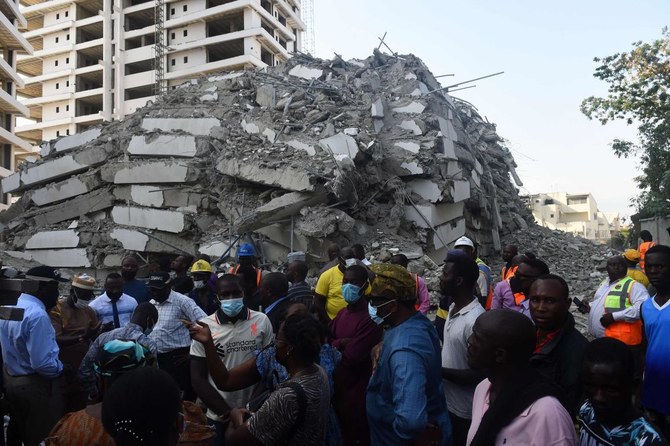LAGOS: Nigerian rescue crews pulled two more survivors out of a collapsed Lagos high-rise building on Tuesday and were communicating with others buried inside the rubble, a day after the disaster killed at least seven and left many more trapped.
The 21-story building was still under construction when it fell abruptly into a pile of concrete slabs on Monday in the wealthy Ikoyi district of Nigeria’s commercial capital.
Rescuers say they have so far managed to pull seven survivors out of the wreckage, but construction workers fear dozens of their colleagues are trapped inside.
Ibrahim Farinloye of the National Emergency Management Agency (NEMA) said at the scene that two of the seven were rescued earlier on Tuesday.
“There is still hope many more are inside. I spoke to some of them just minutes ago and their voices are strong.”
Nigerian President Muhammadu Buhari in a statement late Monday urged “the authorities to step up efforts in rescue operations” for the victims.
But relatives were desperate for news of those missing a day after the collapse.
Sitting on the pavement near the crushed remains of the building, brothers Fawas Sanni, 21, and Afolabi Sanni, 17, were shell-shocked as they waited for news of their sibling.
“Our sister is inside,” said Fawas, a tear rolling down his cheek.
Their 25-year-old-sister Zainab was posted on September 6 to the construction site by the National Youth Service Corps, they said.
“I was the last one who to spoke to her before she went to work yesterday morning,” said the older brother, covering his head with his hands.
Enahoro Tony, a volunteer rescuer, was angry with the rescue operation.
“I retrieved three bodies, then we were chased away by the army,” he said. “What is going on in this country? I hate this country,” he fumed.
Lagos state police say it is too early to determine why the Ikoyi building collapsed, but Lagos emergency management agency manager Femi Oke-Osanyintolu said infractions had been committed in its construction.
“We are going to get to the roots of the matter to prevent a recurrence,” he said.
Lagos State Governor has ordered an investigation.
Two excavators were digging in the pile of concrete early on Tuesday, as the crowd outside the building grew.
A man who declined to give his name said he spoke to relatives and friends, collecting names of those still trapped under the rubble.
Across the street from the site, Moses Oladipo, 65, was waiting for news from his 50-year-old son, who has three children.
“He just came here to visit his friend, before his flight back to the US where he lives,” said the father, crouching on the ground close to the entrance.
“They rescued a man last night… I thought it was him, but no,” he said.
“I still have hope.”
Building collapses are tragically common in Lagos and across Africa’s most populous nation where substandard materials, negligence and a lack of enforcement of construction standards are major problems.
In one of Nigeria’s worst building disasters, more than 100 people, mostly South Africans, died when a church guesthouse crumbled in Lagos in 2014.
An inquiry found the building had been built illegally and had structural flaws.
Two years later, at least 60 people were killed when a roof fell in on a church in Uyo, the capital of Akwa Ibom state, in the east of the country.

